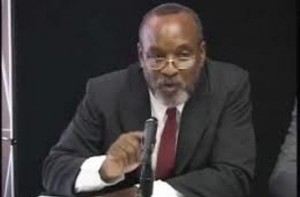BASSETERRE, ST. KITTS, APRIL 18TH 2013 (CUOPM) – The High Court has no jurisdiction to order or compel the Speaker to a Motion of No Confidence on the Order Paper or to ensure that no other business was done in the National Assembly before a Motion of No Confidence was tabled and debated.

“The original motion that was filed by the claimants saying that the Speaker ought to put declarations including putting the Motion of No Confidence to be debated in the House or the National Assembly. So that is the substantive motion; they are suggesting that there is an implied right and that the Speaker should bring it before parliament for debate. They are seeking to get an Order saying that for example there is a constitutional right or be it an implied right and that the Speaker should move to have it tabled,” said Counsel for the government, Mr. Sylvester Anthony.
“The jurisdiction of the court is ousted, we say, by the Powers and Privileges Act as well we say it would be an unnecessary encroachment into the separation of powers doctrine. On behalf of all of the defendants, except the Attorney General. We also argued that the substantive motion which they have filed does not disclose an action for the Court to hear, even if the court had the jurisdiction,” said Mr. Anthony, adding:
“There is nothing in there that raises any issue for the Court to determine. That is a legal argument, but essentially what we are saying is that there is nothing for the Court to hear in terms of the matter that they have filed,” he said.
He disclosed that the applications to strike will be heard first and that is because all the parties agree that in whichever way the court rules, this matter is going to go the Eastern Caribbean Court of Appeal and it will eventually go to the Privy Council in London.
“So there is going to be quite some time before a determination is made in this matter and that I think perhaps influenced the decision to hear this first, let it be determined and then after that we will then go to the substantive originating motion which is the matter that was filed by the claimants,” said Mr. Anthony.
It was agreed that the matter will now be argued during the second week of July which is the 11th and 12th of July for hearing of the two applications to strike with various dates in between for the filing e submissions and do some other matters.
“Once we argue in July, the Court will need some time to rule and once the Court rules at that time, the court will give directions depending on how it rules. So if the Court rules that there is no jurisdiction that is the end of the matter and the appeals would start presumably and if the court rules however that it has jurisdiction, at that point it will be expected that the court will give directions for the hearing of the substantive matter,” he explained.
“So to be clear, without an injunction, Parliament could proceed and function,” said Anthony.
In response to a question, he said: “We don’t have a juristocracy, where the court dictates to Parliament. The Court is there to protect our constitutional rights and where Parliament breaches those, and then the court intervenes.”
“What they say is that there is somehow an implied right of Parliamentarians to bring a Motion of No Confidence and they suggest that the failure of the Speaker to put that before the Parliament, breaches that right. That is an issue clearly for the court to determine. We are saying that even if that is the case, then the right is to bring it, they have brought it to tell the Speaker when to schedule it and to tell the Speaker that he can’t do anything else before he schedules it. We say that is an intrusion into the internal affairs of the Parliament which, is not, we submit, provided for in the constitution.”
He said it will be the case that sets the precedent, well depending on how it goes but most or all of the cases we have found so far are very clear. Even where it was found that the court could make some pronouncements in relation to the Parliament, none of the cases has turned to the extent of the court directing Parliament what to do.
